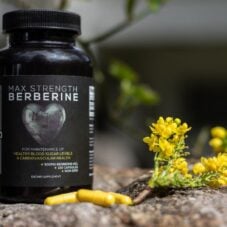Vitality
10 Meriva Curcumin Phytosome Benefits You Need to Know About
For thousands of years, turmeric has been a popular, all-around herbal solution for common ailments. Down with a cough and cold? Feeling feverish? Stomach problems? Got an insect bite or infected wound? Eat or use turmeric for relief!
It is curcumin – turmeric’s main component – that is credited for turmeric’s healing powers. The only problem is that extracted curcumin is very poorly absorbed by the body. Fortunately, curcumin phytosome circumvents this major roadblock, so you can take advantage of this chemical’s amazing health benefits!
Table of Contents
What’s Meriva? And What’s Curcumin Phytosome? Are They The Same Thing?
Before we dive into the 10 benefits of curcumin, you’re probably wondering what Meriva Curcumin Phytosome is. If so, let me give you a quick background:
Basically, Meriva is a patented curcumin delivery system from Italian biotech company, Indena. Meriva is specifically engineered to improve curcumin’s bioavailability or absorption rates.
In ordinary supplements (non-Meriva), the extracted curcumin is packed into capsules or tablets. This traditional method does not help improve curcumin’s bioavailability at all. So, very low amounts (if any) of curcumin is actually absorbed and used by the body.
This is where Meriva’s patent-pending delivery system comes into play. Upon extraction, the curcumin is then bound to a substance known as phosphatidylcholine before it’s packed into capsules/tablets.
The combination of curcumin + phosphatidylcholine is what’s known as curcumin phytosome.
Since phosphatidylcholine is actually part of our cell membranes, it helps make our body more receptive to absorbing the phytosome, which helps improve curcumin’s overall bioavailability.
According to scientific studies, Meriva curcumin phytosome is absorbed up to 2900% better than ordinary curcumin (1)!
Simply put, ordinary or unenhanced curcumin supplements are a waste of money. Very little is absorbed by the body, a great majority will just end up as bodily waste. Hence, the need for Meriva’s much-improved curcumin phytosome delivery system.
If you want to know more about Meriva, we published an ultimate guide to Meriva Curcumin here, so do check it out as well!

How Meriva Curcumin Phytosome Can Help Improve Your Quality of Life
Supplementing with Meriva curcumin will help you take advantage of all the amazing benefits of curcumin. These are:
1) Curcumin is a potent antioxidant that will fight off free radicals
Free radicals are a byproduct of many of the body’s natural processes including immune defense and metabolism. But these free radicals are highly unstable. If left unchecked, they can cause a reaction called ‘oxidative stress’. It can damage cells, fatty acids, proteins, and even your DNA, which can lead to all sorts of health problems.
So, what neutralizes these free radicals?
Free radical neutralizers are called antioxidants. Curcumin is one of them, along with glutathione, vitamins A, C, and E, lycopene, beta carotene, selenium, lutein, and manganese. The more antioxidants you have, the better equipped your body is at fighting off oxidative stress.
If you’re not getting enough antioxidants through your diet, then supplementing with curcumin is a great option. A 6-week study showed that patients who supplemented with curcumin enjoyed higher antioxidant levels in their blood plasma (2). As for the dosage, 500mg per day is enough to see significant changes in plasma antioxidant (3).
2) It’s a potent anti-inflammatory that will fight against chronic inflammation
Inflammation is good in small doses. It’s what the body uses to defend itself against various pathogens, infection, injury and illness. However, when the inflammation goes on and on for a prolonged period of time, then it’s a different story.
You see, chronic inflammation is bad for your health. It results to health issues like arthritis, type 2 diabetes, cancer, heart disease, obesity, bowel disease, neurodegenerative diseases and more (4).
Fortunately, curcumin is a natural anti-inflammatory that can help you win your fight against chronic inflammation. Our 250mg and 500mg Intelligent Labs Curcumin Phytosome supplement have received many positive reviews from actual users who say that it helped reduce symptoms of their chronic inflammation!
This isn’t surprising, to be honest. In a study done on 100 osteoarthritis patients, Meriva curcumin phytosome helped reduce pain and stiffness, improved their walking distance on a treadmill by 336%, and reduced their c-reactive protein levels (an inflammation marker) by 93% (5).

3) Helps improve mood and memory
Have you been feeling a bit blue and down in the dumps lately? Try taking curcumin phytosome instead of antidepressant drugs. A study done by Kulkarni et al. showed that curcumin helps increase levels of the mood hormones serotonin and dopamine. It also enhances the anti-immobility effect of antidepressant drugs like fluoxetine (Prozac), venlafaxine, and bupropion (6).
In a 2018 study published in the American Journal of Geriatric Psychiatry, researchers were able to determine that curcumin helped improve the memory and attention span of middle to older age, non-demented volunteers (7).
The volunteers were given 90mg of curcumin twice a day for 18 months. Brain imaging scans showed a reduction in amyloid and tau accumulation (these promote brain damage and cognitive decline) in areas of the brain which controlled mood and memory (7).
An earlier study published in 2017 also showed similar results. Patients given at least 250mg of curcumin for 4 months experienced fewer episodes of depression and anxiety (8).
4) Curcumin phytosome promotes healthy brain function
Dementia rarely presents in younger people, but it does happen. Amongst the elderly, however, dementia is a lot more common, with Alzheimer’s being the most common form. Chronic inflammation is also said to be one of the root causes of Alzheimer’s (4).
As a natural anti-inflammatory, curcumin can also help patients with dementia and cognitive decline. This is what was discovered by a Japanese study that followed 3 elderly patients with Alzheimer’s. All 3 had severe behavioral and psychological symptoms, such as irritability, apathy, anxiety, and agitation. Two of the patients also suffered from urinary incontinence (9).
The patients were given 764mg of turmeric powder per day (or 100mg of curcumin) for 3 months. At the end of the study, there was a significant reduction in their behavioral and psychological symptoms. After a full year, the patients were living relatively calm, peaceful, and normal lives (9).

5) Lowers risk of cardiovascular disease
Did you know heart disease and stroke are two of the world’s top killers? According to the World Health Organization, millions of people die from these 2 diseases each year. Now, curcumin isn’t some magical phytochemical that can make all of our health problems disappear. However, there is actually good science behind curcumin’s cardiovascular benefits.
So, one of the leading causes of cardiovascular disease is atherosclerosis, where your arteries become blocked with fat and cholesterol. This causes the arteries to harden and narrow and restrict blood flow to your heart.
A 2020 systematic review on 10 studies found that curcumin phytosome can significantly reduce the following (10):
- Aortic atherosclerotic lesion area
- Serum lipid profiles
- Plasma inflammatory indicators
By lowering these atherosclerosis indicators, cardiovascular risk is reduced as well. Curcumin dosage varied by study, but up to 347mg/kg was deemed safe and non-toxic (10).
Additionally, coronary artery bypass grafting patients in Thailand who were given 4g of curcumin per day showed a much lower risk of getting heart attacks compared to the placebo group. Inflammatory markers were also much lower in the curcumin group than in the placebo group (11).
6) Helps prevent and reduce Type 2 Diabetes Mellitus symptoms
Eating a high-calorie diet full of processed foods, unhealthy fat and sugar can lead to excess weight, which then increases the risk of getting type 2 diabetes. If you’re facing this problem, then you’ll be pleased to know that a study done on pre-diabetics has shown that curcumin phytosome can delay the onset of type 2 diabetes (5).
So, 240 patients were given curcumin and placebo for 9 months. Not a single person in the curcumin group was diagnosed with diabetes! But sadly, 16% of the placebo group ended up with diabetes. The curcumin group also showed a slight reduction in weight and waist circumference, along with an improvement of beta cell function (these are cells that make insulin) (5).
Another study, this time on type 2 diabetics, showed that curcumin resulted in improved insulin sensitivity, lower triglycerides, lower body and visceral fat, and a slimmer waistline. All these points to a lower risk of arteriosclerosis and imminent heart attack (12).

7) Slows down the effects of ageing
Surprised? Well, you shouldn’t be. You already know that curcumin is a powerful antioxidant that can fight off free radicals. Obviously, ageing is inevitable and guzzling down antioxidants isn’t going to stop it. But the good news is that ageing – and its effects – can be slowed down.
So, free radicals are generated by many factors, both intrinsic and extrinsic. We’ve already covered intrinsic factors in benefit #1. For extrinsic factors, free radicals are generated by exposure to the sun’s UV rays, smoke, pollution, stress, and the like. All of these can speed up the ageing process and make you look older than your age (13).
As a powerful antioxidant, curcumin can reverse the effects of these free radicals and therefore slow down the effects of ageing.
8) Curcumin is a powerful analgesic and pain reliever
Earlier, you learned that Meriva curcumin phytosome reduces pain and stiffness in osteoarthritis patients. But what about ordinary, everyday aches and pains? Will curcumin help as well?
The answer is yes! 2g of Meriva (or 400mg curcumin) per day is comparable to 1g of pain reliever acetaminophen (paracetamol). Both are well tolerated by the stomach (14).
But while paracetamol is a relatively safe drug, it may cause kidney and liver damage if abused, that is, you take more than the recommended dose. Curcumin, on the other hand, can be taken up to 12g daily with very low probability of toxicity (15).

9) Curcumin phytosome helps improve vision and eye health
Needless to say, eye health is very important. Living with eye and vision problems is no fun at all. But by taking curcumin phytosome on a daily basis, your eye health may be restored.
This is what happened to central serous chorioretinopathy patients with blurry central vision or partial vision loss. They were given 1.2g of Meriva per day (about 240mg of curcumin) for 12 months. The curcumin effectively reduced further loss of vision. A great majority of patients also exhibited significant improvements in their symptoms (16).
A recent 2019 study also confirmed that curcumin may be used in treating major eye diseases. These include glaucoma, macular degeneration, cataracts, conjunctivitis, corneal wound healing, dry eye disease, and more (17).
10) Fights various types of cancer
Getting diagnosed with the Big C is life-changing. Yes, your mortality is laid out bare in front of you. And yes, you’ll feel fear and sadness, maybe even numbness at the news. But it’s far from the end of your journey.
Animal studies have shown that curcumin can slow down the growth of cancer cells, reduce tumor mass, and slow down its progression (18). This is really promising and exciting news for us humans!
There’s a 2019 study that compiled several ongoing clinical trials. Results from initial phases are promising, but there’s still a long way to go before curcumin is announced as a standard treatment for cancer (19). The good thing is that curcumin is affordable, easily available and has no significant side effects, so supplementing with it is fine.
Also, a systematic review of curcumin on enhancing cancer therapy yielded interesting results. The researchers found that curcumin helped reduce the side effects of radiotherapy and chemotherapy. Survival rates were also much higher among those who were given curcumin than those in the placebo group (20).
Conclusion
Taking curcumin phytosome as part of your daily health routine can do wonders for your body. Try our 250mg Intelligent Labs Meriva Curcumin Phytosome today. Or, if you prefer a higher dose, check out our 500mg Curcumin Phytosome variant. Either way, do let us know how it turned out for you!
References
(1) Belcaro, Gianni et al. “Efficacy and safety of Meriva®, a curcumin-phosphatidylcholine complex, during extended administration in osteoarthritis patients.” Alternative medicine review : a journal of clinical therapeutic vol. 15,4 (2010): 337-44.
(2) Sahebkar A., Serbanc M.C., Ursoniuc S., Banach M. Effect of curcuminoids on oxidative stress: A systematic review and meta-analysis of randomized controlled trials. J. Funct. Foods. 2015;18:898–909. doi: 10.1016/j.jff.2015.01.005.
(3) Pungcharoenkul, Kanit, and Phensri Thongnopnua. “Effect of different curcuminoid supplement dosages on total in vivo antioxidant capacity and cholesterol levels of healthy human subjects.” Phytotherapy research : PTR vol. 25,11 (2011): 1721-6. doi:10.1002/ptr.3608
(4) Pahwa R, Goyal A, Bansal P, et al. Chronic Inflammation. [Updated 2020 Aug 10]. In: StatPearls [Internet]. Treasure Island (FL): StatPearls Publishing; 2020 Jan-. Available from: https://www.ncbi.nlm.nih.gov/books/NBK493173/
(5) Chuengsamarn, Somlak et al. “Curcumin extract for prevention of type 2 diabetes.” Diabetes care vol. 35,11 (2012): 2121-7. doi:10.2337/dc12-0116
(6) Kulkarni, Shrinivas K et al. “Antidepressant activity of curcumin: involvement of serotonin and dopamine system.” Psychopharmacology vol. 201,3 (2008): 435-42. doi:10.1007/s00213-008-1300-y
(7) Small, Gary W et al. “Memory and Brain Amyloid and Tau Effects of a Bioavailable Form of Curcumin in Non-Demented Adults: A Double-Blind, Placebo-Controlled 18-Month Trial.” The American journal of geriatric psychiatry : official journal of the American Association for Geriatric Psychiatry vol. 26,3 (2018): 266-277. doi:10.1016/j.jagp.2017.10.010
(8) Lopresti, Adrian L, and Peter D Drummond. “Efficacy of curcumin, and a saffron/curcumin combination for the treatment of major depression: A randomised, double-blind, placebo-controlled study.” Journal of affective disorders vol. 207 (2017): 188-196. doi:10.1016/j.jad.2016.09.047
(9) Hishikawa, Nozomi et al. “Effects of turmeric on Alzheimer’s disease with behavioral and psychological symptoms of dementia.” Ayu vol. 33,4 (2012): 499-504. doi:10.4103/0974-8520.110524
(10) Lin, Ke et al. “Efficacy of Curcumin on Aortic Atherosclerosis: A Systematic Review and Meta-Analysis in Mouse Studies and Insights into Possible Mechanisms.” Oxidative medicine and cellular longevity vol. 2020 1520747. 9 Jan. 2020, doi:10.1155/2020/1520747
(11) Wongcharoen, Wanwarang et al. “Effects of curcuminoids on frequency of acute myocardial infarction after coronary artery bypass grafting.” The American journal of cardiology vol. 110,1 (2012): 40-4. doi:10.1016/j.amjcard.2012.02.043
(12) Chuengsamarn, Somlak et al. “Reduction of atherogenic risk in patients with type 2 diabetes by curcuminoid extract: a randomized controlled trial.” The Journal of nutritional biochemistry vol. 25,2 (2014): 144-50. doi:10.1016/j.jnutbio.2013.09.013
(13) Poljšak, Borut, and Raja Dahmane. “Free radicals and extrinsic skin aging.” Dermatology research and practice vol. 2012 (2012): 135206. doi:10.1155/2012/135206
(14) Di Pierro, Francesco et al. “Comparative evaluation of the pain-relieving properties of a lecithinized formulation of curcumin (Meriva(®)), nimesulide, and acetaminophen.” Journal of pain research vol. 6 (2013): 201-5. doi:10.2147/JPR.S42184
(15) Lao, Christopher D et al. “Dose escalation of a curcuminoid formulation.” BMC complementary and alternative medicine vol. 6 10. 17 Mar. 2006, doi:10.1186/1472-6882-6-10
(16) Mazzolani, Fabio, and Stefano Togni. “Oral administration of a curcumin-phospholipid delivery system for the treatment of central serous chorioretinopathy: a 12-month follow-up study.” Clinical ophthalmology (Auckland, N.Z.) vol. 7 (2013): 939-45. doi:10.2147/OPTH.S45820
(17) Radomska-Leśniewska, Dorota M et al. “Therapeutic potential of curcumin in eye diseases.” Central-European journal of immunology vol. 44,2 (2019): 181-189. doi:10.5114/ceji.2019.87070
(18) Panda, Abir Kumar et al. “New insights into therapeutic activity and anticancer properties of curcumin.” Journal of experimental pharmacology vol. 9 31-45. 31 Mar. 2017, doi:10.2147/JEP.S70568
(19) Willenbacher, Ella et al. “Curcumin: New Insights into an Ancient Ingredient against Cancer.” International journal of molecular sciences vol. 20,8 1808. 12 Apr. 2019, doi:10.3390/ijms20081808
(20) Mansouri, Kamran et al. “Clinical effects of curcumin in enhancing cancer therapy: A systematic review.” BMC cancer vol. 20,1 791. 24 Aug. 2020, doi:10.1186/s12885-020-07256-8




